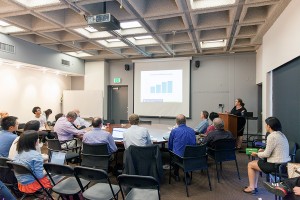Seminar focuses on technology’s impact on developing countries
Public venues provide the first-ever computer contact for over half of the people who go to them in eight different countries, according to a research seminar that the USC Annenberg School for Communication and Journalism hosted with the authors of the Global Impact Study of Public Access to Information & Computer Technologies.

Global perspective · Professor and research lead for the Global Impact Study Araba Sey discusses how access to technology can be a solution to developmental challenges on Monday at the Geoffery Cowan Forum. – Ralf Cheung | Daily Trojan
The Global Impact Study was a five-year comprehensive project that studied the scale, character and impacts of access to information communication and technologies in eight countries: Bangladesh, Botswana, Brazil, Chile, Ghana, Lithuania, the Philippines and South Africa.
“We took a hard look at the impact of public access to information technology,” said Francois Bar, associate professor of communication in the Annenberg School for Communication and Journalism and chair of the study’s research working group. “Connected libraries, cyber cafes and public centers for a long time have been the main way in which people concerned with development tried to bring information technology access to developing countries. Recently, there has been a debate about whether this has been successful or not. Nobody had done an in-depth study to look at this before.”
Araba Sey, a research assistant professor at the University of Washington’s Information School and the research lead for the Global Impact Study, presented an overview of the report.
Sey noted that access to information technologies was seen as the solution to a wide range of developmental challenges.
“Individual access for most people was not likely to be achieved in a short amount of time,” she said. “Extensive investment was made to provide different public venues, such as community centers, libraries, etc.”
Sey noted that the most consistent finding in this study was that public access venues tended to be frequented not by the poor, marginalized population that they were targeting, but by people who were relatively educated with high incomes.
“The results themselves leave us with conflicting claims of public access — some say the venues have been successful while others say they haven’t,” Sey said. “This raises questions about whether or not public access actually does have an impact on development.”
The study found that although the majority of users were young, educated students with several years of computer experience, public venues still provided the first-ever computer contact for 50 percent of survey respondents and provided the first-ever Internet access for 62 percent of the respondents.
Several authors of the Global Impact Study Report also gave in-depth presentations on their specific areas of research.
Beth Kolko, professor of human centered design and engineering at the University of Washington and the principal investigator on the non-instrumental uses study, led a discussion on the value of using computers for personal or leisure reasons. This part of the study, conducted in Brazil, found that people who use the computer for leisure and personal reasons performed just as well on computer tasks as those who used the computer for instrumental uses, suggesting that informal training is important to developing computer skills.
“I am not familiar with how developing countries work but I learned a lot from the presentation,” said Sam Chan, a first-year graduate student in communication.
Follow us on Twitter @dailytrojan
